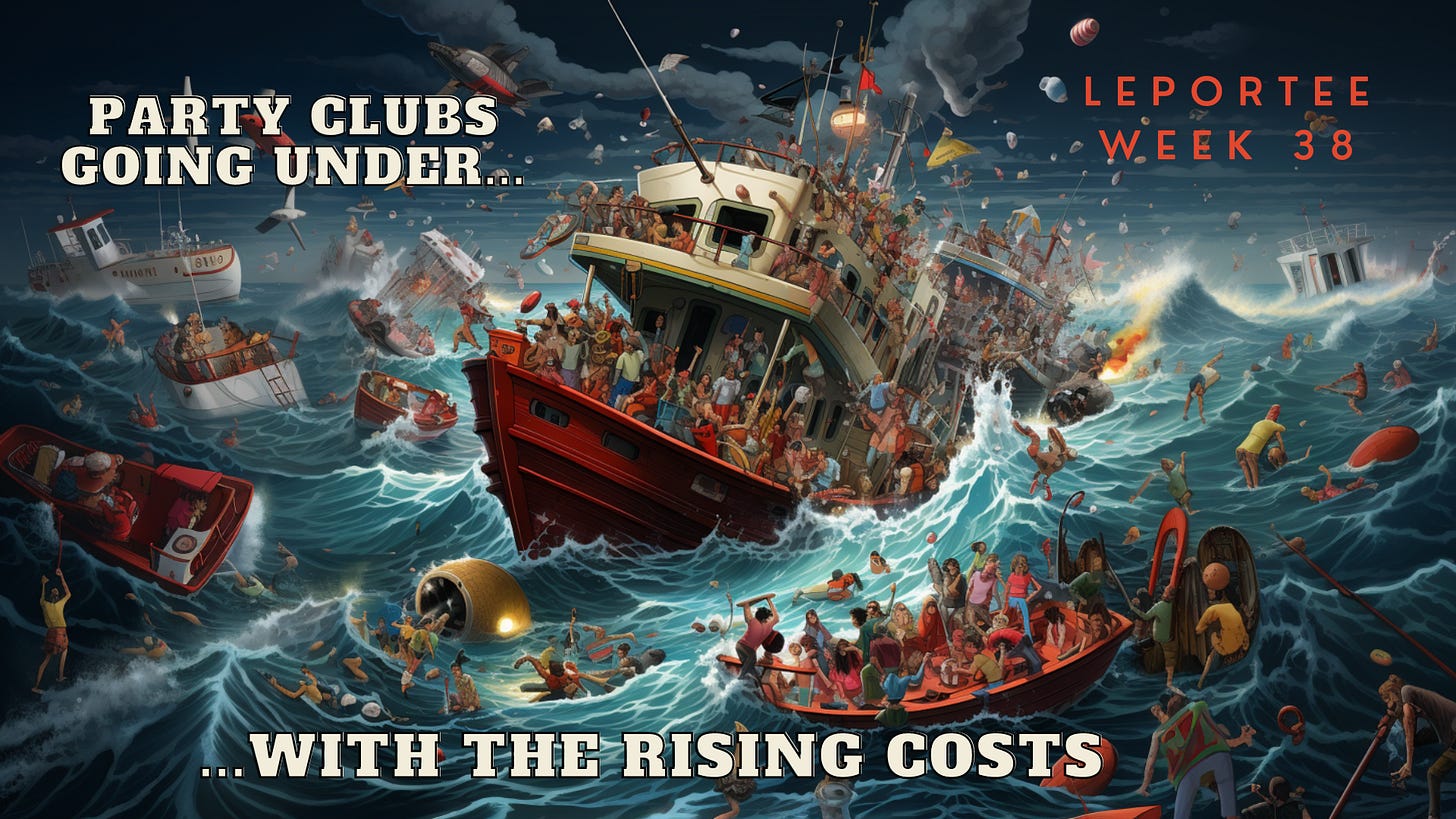TLDR: Too Long Didn’t Read
This week touches on several key facets of the hospitality industry, including the integration of AI in revenue management and the importance of data utilization and team collaboration. It also highlights the performance fluctuations of the Skift Travel 200 Index due to the COVID-19 pandemic and the challenges faced by Berlin's clubs, such as rising costs and noise complaints. The impact of online review platforms on hoteliers' reputation and bookings is discussed, along with a decline in bleisure travel and the shift toward separate business and leisure trips. Future trends in the industry, like demographic changes and the influence of remote work policies, are explored, as well as the potential for continued economic growth in China, which could benefit hotel businesses.
0. News snippets
Not important enough to expand on, but worth hearing about
Tech growth in India is powering hospitality growth; Another week another war, this time in Armenia; Since they had nothing else to do, the Mexican police arrested Chucky the demon doll (Sharp contrast to the effectiveness of the cartels);
1. Main Hospitality News
Core news related to the industry
Revenue management with AI
A recent interview with a Google ex, co-founder of FLYR sheds some light on companies that are trying to use AI and thus optimize revenue (in this case for others). The interview goes into basic recommendations like hotels “actually” using their data to optimize revenue (something several hotels still do not do), for the revenue teams to focus on uplifting revenue itself and not keeping previous guests happy. As well as, highlighting how a severe lack of collaboration within teams is according to Jens Munch, a big reason for a lack of good results. While the rest of the interview goes into promoting the product itself (check it out under flyr.com in case you want to get AI help with your revenue management), the interesting learning for us is that basic problems in the industry, like lack of collaboration, persist. And that stating basic things like working with others and improving your revenue can get you a long way. In a nutshell, all the AI model of FLYR does is look at past data and can optimize prices, and restrictions when needed (certain days can only be booked in the group), planning of revenue & management of the group quotes and displacement analysis.
Skift Travel 200 Index - Shows the movement of the travel industry
The Skift Travel 200 stock index is designed to measure the $1 trillion-plus market for public travel companies, providing a number to represent the performance of publicly traded travel companies. For now, it tracks 196 public companies from 34 countries divided into five sectors: Accommodations, Airlines, Travel Tech, Cruise and Tours, and Ground Transportation.
As of September 15, 2023, the Skift Travel 200 index stood at 985, down slightly from its starting value of 1,000 on December 31, 2018, with notable fluctuations due to the COVID-19 pandemic and subsequent recovery, outperforming the broader U.S. stocks over the past year by 8%.
When looking at the sectors, it showed Travel Tech has been the best-performing sector over the past year, with a 42% increase, while Cruise and Tours have also seen significant gains, though ground transportation has underperformed, and Accommodations have slightly lagged. More on Skift.
Clubs in Berlin are going under
The best clubs in the world, at least some, are in Berlin. Lately, they haven’t been doing so well. Why? A recent study/survey of club owners across the city showed a few cracks in the current business model. First of all, growing costs make it hard to make a profit (a trend all other industries have noticed too). A decrease in pure revenue, and no clear pre-corona recovery insight, showing a lack of visitors. Finally, perhaps even more interesting, a 37% spike in complaints from local neighbourhoods about the club's noise. Perhaps all the home office people need to just go back on business trips? Together we can likely see a wave of bankruptcies very soon. Similar to that of bars in the UK, which we reported on a few months back. If this piece of news touches you, make sure you tip your bouncer and spend a bit extra on that overpriced beer in the club, since that might be the last time you are doing it.
Hotels can not remove themselves from review platforms (in most cases)
Online review platforms, like TripAdvisor and HolidayCheck, significantly impact hoteliers' reputations and bookings as travellers increasingly rely on reviews for online reservations. While hoteliers must actively manage their profiles to address criticism and fake reviews, there's generally no right to demand full profile removal.
Legal principles dictate that hotels must accept reviews on these platforms to preserve freedom of expression and information. However, exceptions exist when a platform's commercial practices compromise neutrality. Especially if they offer paid premium packages that may bias reviews and advertising. Decisions will depend on individual circumstances and the platform's focus – neutral reviews or commercial offerings. More on Top Hotels.
Bleisure is down, replacement none?
Some of you might remember, how the post-corona period was showing very profitable trends for hotels, where shoulder days that otherwise were always empty, were booked up by bleisure travellers. Business & Leisure. Even the CEO of Accor was bragging about how Corona allowed him to fill days like Sundays, which otherwise were always troublesome. Well, that is decreasing now and people are going back to their normal selves. Holiday or Work. Not combined. This is calling for a return to B2B travel, which however, as reported last week, is still not recovered from corona and might not be coming back any time soon. What remains is, standing out and being better than competition, a strategy that usually does not fail.
Skift does a future trends summary
Another week, another industry trends summary. This time by Skift. 4 main topics are mentioned, that “should” impact the future of the hospitality industry. Demographics change (people getting older, need for appropriate products & of course staffing crisis). Loneliness crisis and how Western communities are struggling to provide connection and travel making money from that. Advances in AI and how we will all not work, but just chill. Finally climate adaptation. Exciting 4 trends, that we heard elsewhere, except the loneliness part. Future forecasting for the win!
Travellers are spending less on their trips
With all the news above, another "positive" impact has been reported this week. Travellers are trading down their travel costs. Whether it's a cheaper hotel or an entirely different destination. The trend is also largely associated with increasing prices for that travel, hence if anything people are not spending less, they just haven't caught up with the inflation. Interestingly enough, the article provides a statistic on high price hotels make of up the total hotel sector. And while it has dropped from 22 levels, it now looks very similar to 2019. Hence, if anything, people have likely spent their cash reserves from Corona, outtravelled their urge to explore after sitting inside for 2 years and now are going back to normal.
2. Externalities
Econimics, finance, geopolitics. All have an impact on the hospitality sector.
Home office not as welcome
Home office not welcome? Not as much anymore. Google, for example, is pushing for 3 days at the office for all employees, with alternatives being negative performance reviews. In leading German firms, the situation is mixed. It has become acceptable in some, where 1-3 days remote is acceptable, while in others it is outright not possible. Nonetheless, almost all companies accept it in some way or form. While in the US 39% of new hires have hybrid contract models, where part of the week can be spent working from home. The old news, whatever Google is pushing for people have realised they can stay at home and work, while employers save money on offices. Hence, it is here to stay.
China is old, but still good to go
There is an urban myth going around, that China has grown old before it has grown rich. The demographics are already showing a decreasing ageing population, while the GDP per Capita is still not at the first-world level. That is a myth. Most of the GDP growth came not necessarily from population growth but from university attendance & a general increase in highly skilled professionals. Additionally, China’s strict retirement age hasn’t done the job market any good. 55 for women & 65 for men. Something that can be fixed with a policy. Women alone can be brought up to another 10 years of work (surely “exciting” news for those retired). With a few other factors as well, future economic growth can keep going and isn’t likely at risk of collapsing, because of demographics alone. Hence, hoteliers, hope for another good decade of Chinese coming to your business to spend that hard-earned cash!
3. Academia
Scientific papers related to the topics above. For those who want to know for sure ;)
During the pandemic, an academic study was conducted to see how the lockdowns were affecting people’s perception of travel. Initially, an average traveller would plan to go on holiday at least once every 12 months. The study showed that people in the pandemic were already planning to go at least once every 6-9 months, due to the lockdowns. While easy to agree to today, a few years back this was still a speculation. Academia, folks, sometimes uncovers data that we only take for granted years later!
4. Readables
Books, podcasts & the big stuff.
How it is like to build the biggest cruise ship in the world?
While the construction industry is not solely related to Hospitality or Services, big chunks are. This week we recommend a recent podcast from “The World’s Best Construction Podcast” (their actual name). Specifically their episode about building the latest biggest cruise ship in the world and how it's done. While the podcast does not go into the service details, the construction process is pretty exciting.















